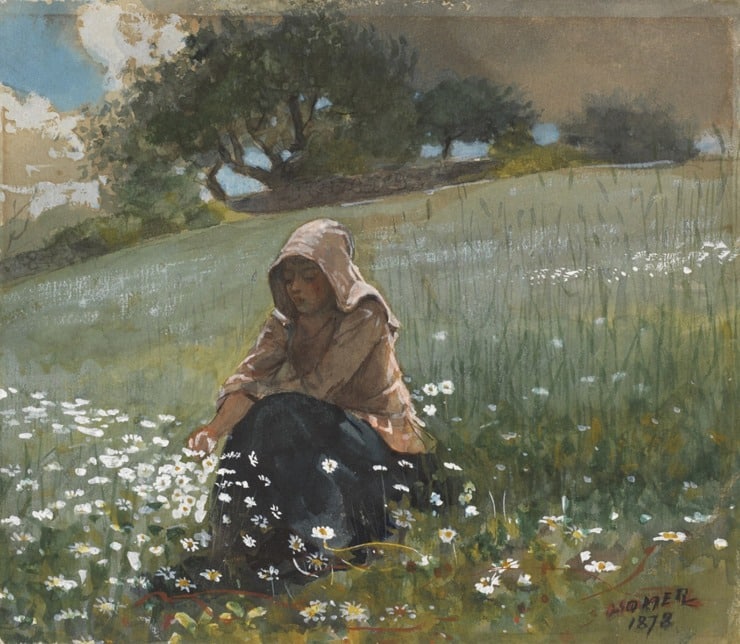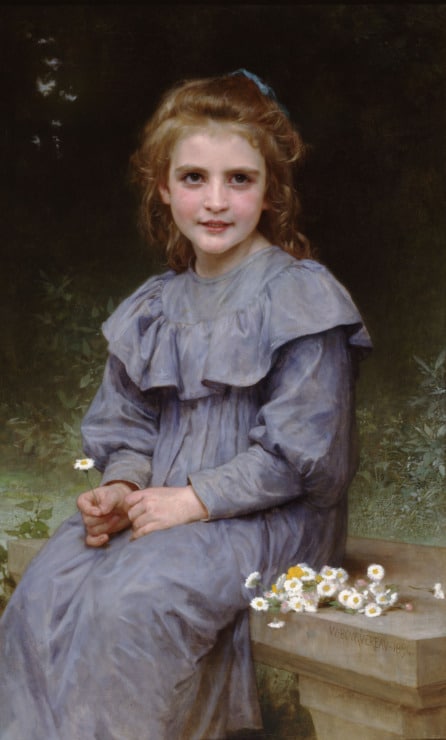< Return to all Wordsworth poems
To the Daisy
In youth from rock to rock I went
From hill to hill, in discontent
Of pleasure high and turbulent,
Most pleas’d when most uneasy;
But now my own delights I make,
My thirst at every rill can slake,
And gladly Nature’s love partake
Of thee, sweet Daisy!
When soothed a while by milder airs,
Thee Winter in the garland wears
That thinly shades his few grey hairs;
Spring cannot shun thee;
Whole summer fields are thine by right;
And Autumn, melancholy Wight!
Doth in thy crimson head delight
When rains are on thee.
In shoals and bands, a morrice train,
Thou greet’st the Traveller in the lane;
If welcome once thou count’st it gain;
Thou art not daunted,
Nor car’st if thou be set at naught;
And oft alone in nooks remote
We meet thee, like a pleasant thought,
When such are wanted.
Be Violets in their secret mews
The flowers the wanton Zephyrs chuse;
Proud be the Rose, with rains and dews
Her head impearling;
Thou liv’st with less ambitious aim,
Yet hast not gone without thy fame;
Thou art indeed by many a claim
The Poet’s darling.
If to a rock from rains he fly,
Or, some bright day of April sky,
Imprison’d by hot sunshine lie
Near the green holly,
And wearily at length should fare;
He need but look about, and there
Thou art! a Friend at hand, to scare
His melancholy.
A hundred times, by rock or bower,
Ere thus I have lain couch’d an hour,
Have I derived from thy sweet power
Some apprehension;
Some steady love; some brief delight;
Some memory that had taken flight;
Some chime of fancy wrong or right;
Or stray invention.
If stately passions in me burn,
And one chance look to Thee should turn,
I drink out of an humbler urn
A lowlier pleasure;
The homely sympathy that heeds
The common life, our nature breeds;
A wisdom fitted to the needs
Of hearts at leisure.
When, smitten by the morning ray,
I see thee rise alert and gay,
Then, chearful Flower! my spirits play
With kindred motion:
At dusk, I’ve seldom mark’d thee press
The ground, as if in thankfulness,
Without some feeling, more or less,
Of true devotion.
And all day long I number yet,
All seasons through, another debt,
Which I wherever thou art met,
To thee am owing;
An instinct call it, a blind sense;
A happy, genial influence,
Coming one knows not how nor whence,
Nor whither going.
Child of the Year! that round dost run
Thy course, bold lover of the sun,
And chearful when the day’s begun
As morning Leveret,
Thou long the Poet’s praise shalt gain;
Thou wilt be more belov’d by men
In times to come; thou not in vain
Art Nature’s Favorite.
—William Wordsworth
Enjoy Artistic Representations of “To the Daisy” by William Wordsworth

Girl and Daisies by Winslow Homer, 1878.

Daisies by William-Adolphe Bouguereau, 1894.
Listen to these Readings of “To the Daisy”
About William Wordsworth
William Wordsworth, an English poet born in 1770, is credited with having a strong impact on the poetry of his time. He worked with Samuel Taylor Coleridge to publish a collection, Lyrical Ballads, which includes poems believed to be among the most influential in Western literature. With this publication, the two helped initiate English literature’s Romantic Age.

Jerwood Centre at the Wordsworth Trust in Grasmere
Wordsworth also worked to increase the accessibility of poetry, encouraging the use of more common language, and promoting the virtues of lyric poetry.
While in college, Wordsworth went on a walking tour of England and lived for a time in France, where he was greatly impacted by the French Revolution. His earliest work was published in 1793.
His most famous work, The Prelude, was published by his widow in 1850. He worked on the semi-autobiographical poem throughout much of his life, never quite satisfied to publish it.
Wordsworth served as England’s Poet Laureate from 1843 until he died in 1850.
Get Every Day Poems, free…